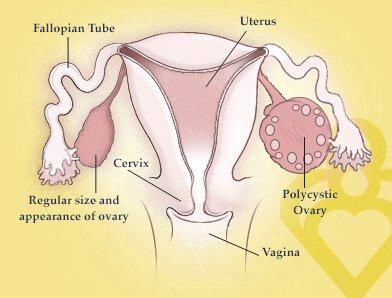Polycystic ovary syndrome or PCOS affects an estimated 6-10% of all women
Polycystic ovary syndrome, PCOS, interferes with normal ovulation and results in an increase in male hormone levels, which causes many of the symptoms of PCOS. Irregular ovulation causes irregular menstrual cycles. Abnormal insulin production and metabolic problems also contribute to the development of PCOS. The increase of male hormones (androgens) in PCOS leads to acne and abnormal hair growth (hirsutism). Many women with PCOS have multiple cysts on their ovaries (polycystic ovaries). A polycystic ovary may be up to three times larger than normal. Because women with PCOS usually experience significant ovulation problems, there is an increased difficulty in achieving pregnancy.
Recent studies suggest that PCOS is due to an underlying metabolic problem known as insulin resistance.
 When the body’s muscles and fat tissues become resistant to insulin action, the pancreas produces increased amounts insulin, leading to high insulin levels. In a woman with PCOS, these high insulin levels can set into play a vicious cycle that makes weight loss extremely difficult. Because the high insulin levels tend to produce food cravings, particularly in the form of carbohydrates, the woman often finds herself in a state of over-nourishment. These high insulin levels also drive the ovary to produce high amounts of male hormones (androgens) leading to Ovarian Confusion. This unhealthy environment in the ovary causes follicles to literally die before they release mature eggs resulting in ovulation disruption. Learn about the symptoms of PCOS.
When the body’s muscles and fat tissues become resistant to insulin action, the pancreas produces increased amounts insulin, leading to high insulin levels. In a woman with PCOS, these high insulin levels can set into play a vicious cycle that makes weight loss extremely difficult. Because the high insulin levels tend to produce food cravings, particularly in the form of carbohydrates, the woman often finds herself in a state of over-nourishment. These high insulin levels also drive the ovary to produce high amounts of male hormones (androgens) leading to Ovarian Confusion. This unhealthy environment in the ovary causes follicles to literally die before they release mature eggs resulting in ovulation disruption. Learn about the symptoms of PCOS.
The cause of the hormone imbalance which occurs with PCOS is not fully understood, but genetics may be a factor.
PCOS is believed to have ancient origins from the days when food was scarce. The main risk factor for polycystic ovary syndrome (PCOS) is a family history of PCOS. If you have polycystic ovary syndrome, your sisters and daughters have a 50% chance of developing PCOS. Learn when you should seek help for PCOS.
A family history of diabetes may increase your risk for PCOS because of the strong relationship between diabetes and PCOS. Research is ongoing on this risk factor. Abnormal insulin production and metabolic problems may contribute to the development of PCOS. If you do not ovulate normally for any length of time, you may develop multiple cysts on your ovaries (polycystic ovaries).
You may have more regular menstrual cycles as you near menopause. The reason for this is not known. However, your history of PCOS may still increase your long-term risk of high blood pressure (hypertension), heart disease, diabetes, or endometrial cancer.
The long-term use of the anti-seizure medication valproate has been related to an increased risk of developing PCOS.

- Symptoms of PCOS
- When to Seek Help for PCOS
- PCOS and Infertility
- PCOS Treatment
- Join Our Fertility Fitness Program


